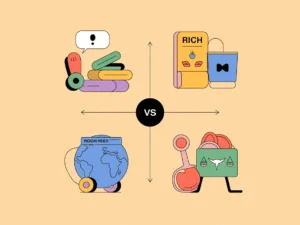We all dream of financial freedom, but few of us truly understand how the rich manage their money. It’s not just about earning more—it’s about how you handle, protect, and grow what you have.

Why Understanding Money Rules is Key to Building Wealth
Wealth isn’t accidental. Most rich people follow structured, intentional rules that guide their decisions. Knowing these rules can save you from financial mistakes, help you grow your net worth, and protect your money from unnecessary risks.
Common Misconceptions About How Rich People Manage Money
- They flaunt all their wealth (in reality, most keep finances private).
- They spend extravagantly all the time (many live below their means).
- They only rely on luck or high income (strategic planning and multiple income streams matter more).
Quick Overview of the 7 Money Rules
- Never reveal your full income
- Keep 1–5% of your net worth in cash
- Don’t spend more than 30% of what you earn
- Have an emergency fund
- Learn the tax code
- Use debt to buy assets first
- Have multiple income streams
These rules might seem simple, but they separate the wealthy from the rest. Let’s dive into each one.
Rule 1 – Never Reveal Your Full Income
Rich people understand a secret: privacy protects wealth. Oversharing income can create social pressure, unwanted expectations, and even professional disadvantages.
Why Privacy Protects Your Wealth
Keeping your earnings confidential helps you:
- Avoid financial exploitation from friends or family
- Reduce envy or social pressure to spend
- Maintain negotiation leverage in business or career
How Oversharing Can Hurt Financial Strategy
- If everyone knows your income, people may expect loans, gifts, or favors.
- Social comparison can tempt you to spend unnecessarily.
- Public knowledge of your earnings may influence professional deals or partnerships.
Strategies to Keep Your Income Confidential
- Social Media Tips
- Avoid posting salary details or luxury purchases online.
- Keep financial milestones private; focus on achievements or learning instead.
- Conversations with Friends/Family
- Be vague about your earnings. You can discuss money in terms of budgeting, savings, or investments instead.
- Professional Discretion
- Only share your exact income with advisors or trusted professionals.
- Keep sensitive discussions off casual chats or workplace gossip.
Think of your income like a valuable asset—the less people know, the safer it is.
Rule 2 – Keep 1–5% of Your Net Worth in Cash
Even the wealthy don’t keep all their money in checking accounts. They understand the importance of liquidity—having cash available for emergencies or opportunities—without letting it sit idle and lose value.
Understanding the “Liquidity Buffer” Concept
A liquidity buffer is a small percentage of your net worth kept in cash for flexibility. Typically, this is 1–5% of total assets.
- Example: If your net worth is $500,000, keeping $5,000–$25,000 liquid ensures you can handle emergencies or jump on a quick investment.
Why Too Much Cash Can Be Detrimental
- Cash earns minimal interest and can lose value due to inflation.
- Too much idle money means missed investment opportunities.
- Wealthy people strike a balance between liquidity and growth.
How to Calculate Your Ideal Cash Reserve
- Determine your total net worth (assets minus liabilities).
- Multiply by 0.01 to 0.05 to find your cash buffer.
- Adjust based on your risk tolerance and lifestyle needs.
Best Places to Store Liquid Cash
- High-yield savings accounts: Earn interest while keeping funds accessible.
- Money market accounts: Safe and slightly higher returns than regular savings.
- Short-term CDs: Use for slightly longer-term cash storage with low risk.
💡 Tip: Keep your cash buffer separate from your daily spending account to avoid accidental depletion.
Rule 3 – Don’t Spend More Than 30% of What You Earn
Living below your means is a cornerstone of wealth building. Spending responsibly allows you to save, invest, and grow your net worth.
The 30% Rule Explained
- The rule is simple: spend no more than 30% of your income on discretionary expenses.
- Essentials like rent, bills, and groceries are separate—this applies mostly to non-essential spending.
Tracking Expenses Effectively
- Use apps like Mint, YNAB, or PocketGuard to monitor spending.
- Categorize expenditures: essentials, luxuries, investments.
- Review monthly statements to identify leaks.
Tips to Reduce Unnecessary Spending
- Budget Hacks
- Set monthly spending limits per category.
- Allocate savings first, then plan for discretionary spending.
- Smart Shopping Strategies
- Make shopping lists and avoid impulse purchases.
- Wait 24 hours before making non-essential buys.
- Subscription Audits
- Cancel unused subscriptions.
- Bundle services or switch to cheaper alternatives.
💡 Tip: Think of every dollar spent as an investment—will it grow your wealth, or just disappear?
Rule 4 – Have an Emergency Fund
Even wealthy individuals keep an emergency fund—it’s a financial safety net that protects you from unexpected events and prevents you from taking high-interest debt when emergencies occur.
Why Even Rich People Keep an Emergency Fund
- Sudden expenses happen: car repairs, medical emergencies, home maintenance.
- It prevents the need to liquidate investments during unfavorable market conditions.
- Provides peace of mind, allowing for smarter financial decisions.
How to Calculate Your Emergency Fund Size
- Basic formula: 3–6 months of living expenses.
- High-risk professions or self-employed individuals may need 6–12 months.
- Example: If monthly expenses are $3,000, aim for $9,000–$18,000 in liquid savings.
Quick Tips to Build It Fast
- Side Hustles
- Freelancing, tutoring, or part-time work can accelerate savings.
- Automatic Transfers
- Set up automatic transfers from checking to savings to ensure consistent growth.
💡 Tip: Keep your emergency fund in a high-yield savings account or money market account for easy access and better returns than a regular savings account.
Rule 5 – Learn the Tax Code
Understanding taxes is one of the most powerful tools for building wealth. Rich people know how to minimize tax liabilities legally, keeping more money to invest and grow.
Why Tax Knowledge Builds Wealth
- Taxes can eat a significant portion of your income if ignored.
- Strategic planning allows you to maximize deductions, credits, and investment growth.
- It ensures you’re not paying more than legally required.
Key Tax Strategies Rich People Use
- Tax Deductions
- Business expenses, mortgage interest, and education-related deductions.
- Tax Credits
- Energy-efficient home upgrades, child care, and retirement contributions.
- Retirement Accounts
- 401(k), IRA, or Roth IRA contributions reduce taxable income and grow tax-deferred.
Resources to Learn the Tax Code
- IRS website for official guidelines and forms
- Books and courses by tax experts (e.g., Tom Wheelwright, Robert Kiyosaki)
- Professional accountants for personalized advice
💡 Tip: Even a basic understanding of tax deductions and retirement contributions can save thousands each year and accelerate wealth building.
Rule 4 – Have an Emergency Fund
Even wealthy individuals keep an emergency fund—it’s a financial safety net that protects you from unexpected events and prevents you from taking high-interest debt when emergencies occur.
Why Even Rich People Keep an Emergency Fund
- Sudden expenses happen: car repairs, medical emergencies, home maintenance.
- It prevents the need to liquidate investments during unfavorable market conditions.
- Provides peace of mind, allowing for smarter financial decisions.
How to Calculate Your Emergency Fund Size
- Basic formula: 3–6 months of living expenses.
- High-risk professions or self-employed individuals may need 6–12 months.
- Example: If monthly expenses are $3,000, aim for $9,000–$18,000 in liquid savings.
Quick Tips to Build It Fast
- Side Hustles
- Freelancing, tutoring, or part-time work can accelerate savings.
- Automatic Transfers
- Set up automatic transfers from checking to savings to ensure consistent growth.
💡 Tip: Keep your emergency fund in a high-yield savings account or money market account for easy access and better returns than a regular savings account.
Rule 5 – Learn the Tax Code
Understanding taxes is one of the most powerful tools for building wealth. Rich people know how to minimize tax liabilities legally, keeping more money to invest and grow.
Why Tax Knowledge Builds Wealth
- Taxes can eat a significant portion of your income if ignored.
- Strategic planning allows you to maximize deductions, credits, and investment growth.
- It ensures you’re not paying more than legally required.
Key Tax Strategies Rich People Use
- Tax Deductions
- Business expenses, mortgage interest, and education-related deductions.
- Tax Credits
- Energy-efficient home upgrades, child care, and retirement contributions.
- Retirement Accounts
- 401(k), IRA, or Roth IRA contributions reduce taxable income and grow tax-deferred.
Resources to Learn the Tax Code
- IRS website for official guidelines and forms
- Books and courses by tax experts (e.g., Tom Wheelwright, Robert Kiyosaki)
- Professional accountants for personalized advice
💡 Tip: Even a basic understanding of tax deductions and retirement contributions can save thousands each year and accelerate wealth building.
Rule 6 – Use Debt to Buy Assets First
Wealthy people understand the difference between good debt and bad debt. Using debt strategically allows you to grow your wealth faster, instead of falling into financial traps.
Understanding Good Debt vs. Bad Debt
- Good Debt: Borrowing to purchase assets that generate income or appreciate in value, such as real estate, rental properties, or investments.
- Bad Debt: High-interest credit cards or loans used to buy depreciating items like cars or gadgets.
The goal is to leverage debt for growth, not consumption.
How to Use Leverage to Grow Wealth
- Real Estate
- Take a mortgage to buy rental properties.
- Rent covers mortgage payments while property value appreciates.
- Investments
- Use low-interest loans to invest in stocks or other income-generating assets.
- Ensure returns exceed interest rates to profit.
Risks and Precautions
- Don’t over-leverage: maintain manageable debt ratios.
- Always have a cash buffer for emergencies.
- Diversify assets to avoid putting all borrowed funds in one investment.
💡 Tip: Treat debt like a tool, not a crutch. The wealthy use it to create more money, not more problems.
Rule 7 – Have Multiple Income Streams
Relying on a single source of income is risky. The wealthy diversify to protect themselves from market shifts and accelerate wealth building.
Why Relying on One Income Source Is Risky
- Job loss or business downturns can devastate finances.
- Single-income households are vulnerable to unexpected expenses.
- Diversification ensures stability and long-term growth.
Types of Income Streams
- Passive Income:
- Dividends from stocks, rental income, royalties from books or music.
- Side Hustles:
- Freelancing, consulting, online businesses, or part-time work.
- Investments:
- Stocks, bonds, ETFs, cryptocurrencies, or other financial instruments.
How to Build Additional Streams Strategically
- Start small and gradually scale income sources.
- Focus on streams that align with your skills or interests.
- Reinvest earnings to grow passive income over time.
💡 Tip: Even small side hustles or investments can compound into significant wealth when done consistently.
Common Mistakes People Make About Money
Even when people earn well, mistakes can prevent wealth accumulation. Avoiding these pitfalls is key to long-term financial success.
Overspending Despite High Income
- High earners often inflate lifestyles to match income.
- Expensive cars, big houses, and luxury goods can erode net worth quickly.
- Tip: Track spending and follow the 30% discretionary rule.
Ignoring Tax Strategies
- Many miss deductions, credits, and retirement advantages.
- Paying more than required reduces capital available for investing.
- Tip: Learn basic tax strategies or hire a trusted accountant.
Relying Solely on a Single Job
- Single-income dependency creates vulnerability to layoffs or industry shifts.
- Diversifying income sources reduces risk and accelerates wealth.
- Tip: Explore side hustles, investments, or passive income streams.
Examples of Wealthy People Who Follow These Rules
Studying real-life examples shows that these strategies work in practice, not just theory.
Entrepreneurs and Investors
- Warren Buffett – Lives frugally, invests wisely, and leverages tax advantages.
- Elon Musk – Uses debt and equity strategically to fund ventures and grow assets.
Celebrities and Public Figures
- Oprah Winfrey – Diversified income streams from media, investments, and business ventures.
- Mark Cuban – Expertly manages taxes, invests intelligently, and maintains liquidity.
Everyday Millionaires
- Individuals who consistently save, invest in assets, and live below their means.
- Many middle-class millionaires achieved wealth by following disciplined money rules rather than relying on luck.
💡 Lesson: Wealth is about strategy, not luck. Following the rules consistently produces results over time.
Tools and Resources to Manage Your Wealth
Having the right tools simplifies implementation of these money rules.
Budgeting Apps
- Mint – Tracks income, expenses, and savings goals.
- YNAB (You Need a Budget) – Encourages proactive budgeting and cash flow control.
- PocketGuard – Simple app for daily spending awareness.
Investment Platforms
- Robinhood, Fidelity, Vanguard – Stock, ETF, and mutual fund investing.
- Betterment, Wealthfront – Automated, low-fee portfolio management.
Tax Planning Tools
- TurboTax, H&R Block – Simplify filing and maximize deductions.
- QuickBooks – Excellent for business owners tracking expenses and income.
- IRS website – Official guidelines and resources for all taxpayers.
💡 Tip: Use technology to stay organized, informed, and proactive. Automation helps prevent mistakes and saves time.
Actionable Steps to Start Implementing These Rules Today
Applying these 7 money rules may seem overwhelming at first, but breaking them into actionable steps makes it manageable. Start small and build momentum over time.
Step 1: Track Your Income and Expenses
- List all sources of income and monthly expenses.
- Use budgeting apps like Mint or YNAB to visualize cash flow.
- Identify areas where you can cut unnecessary spending.
Step 2: Build Your Emergency Fund
- Aim for 3–6 months of living expenses in liquid savings.
- Automate transfers from your checking account to a high-yield savings account.
- Consider using side hustles to accelerate your fund growth.
Step 3: Learn About Taxes and Legal Loopholes
- Study deductions, credits, and retirement account benefits.
- Use books, courses, or consult an accountant.
- Even basic knowledge can save thousands each year.
Step 4: Diversify Your Income Streams
- Identify one or two side hustles that match your skills.
- Explore passive income options like dividends, rental income, or royalties.
- Gradually scale income sources to create stability and growth.
Step 5: Use Debt Strategically for Growth
- Only borrow to invest in assets that generate income or appreciate in value.
- Avoid high-interest consumer debt.
- Monitor leverage ratios and maintain liquidity to reduce risk.
💡 Tip: Implementing one step at a time ensures consistency and long-term success. Don’t try to do everything at once.
Conclusion
Building wealth isn’t about earning the most—it’s about how you manage, protect, and grow your money. By following these 7 money rules, you can:
- Keep your finances secure and private
- Ensure liquidity without losing growth potential
- Avoid overspending and build an emergency fund
- Leverage tax strategies and debt wisely
- Diversify income streams to protect against risk
Start by picking one rule today and apply it consistently. Over time, these habits compound, turning disciplined financial practices into lasting wealth.


